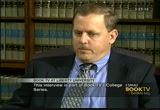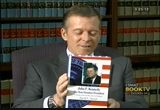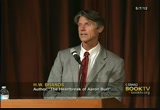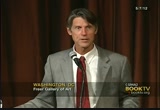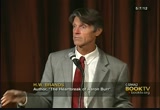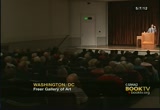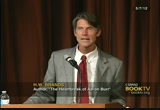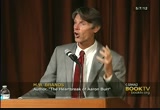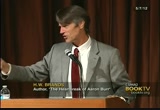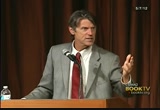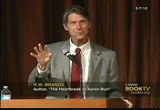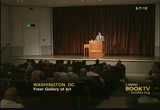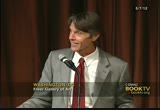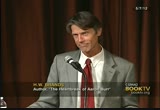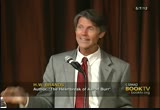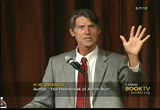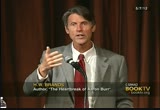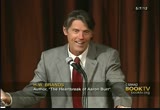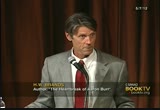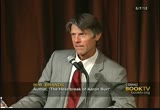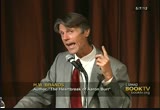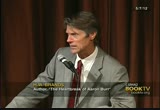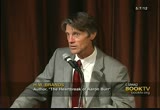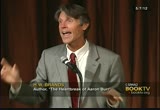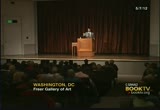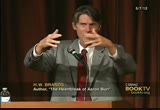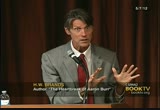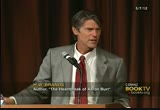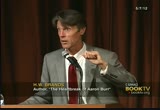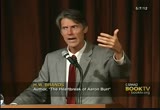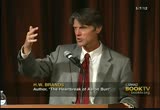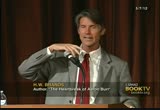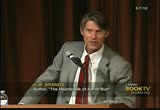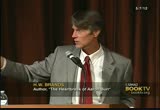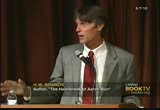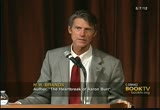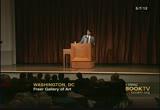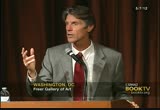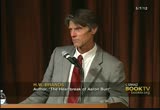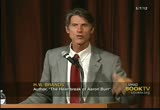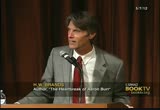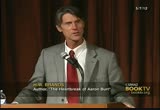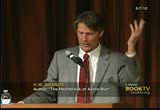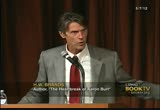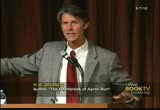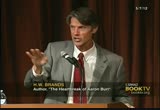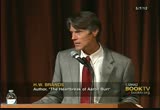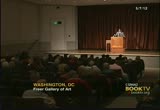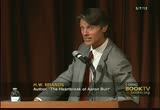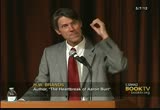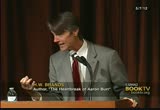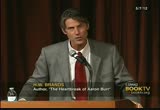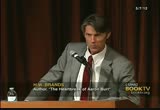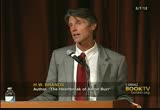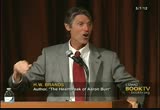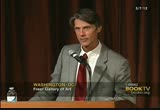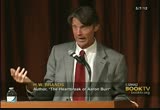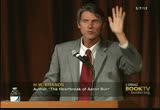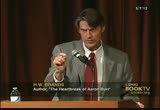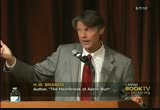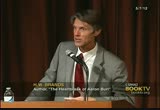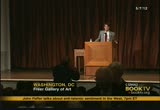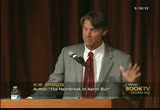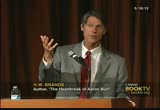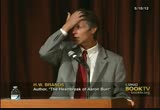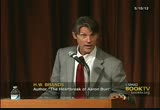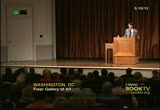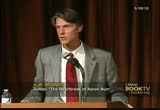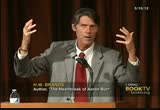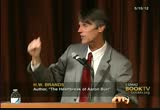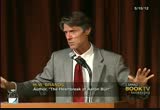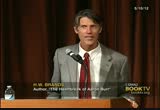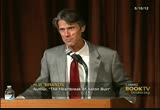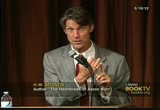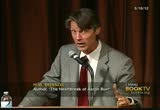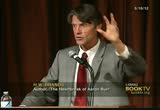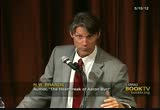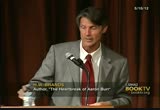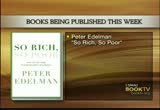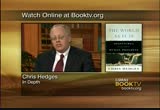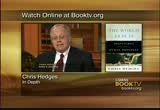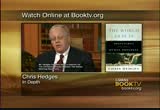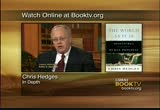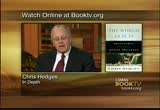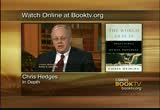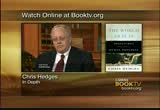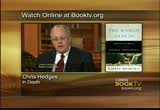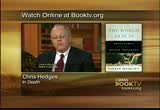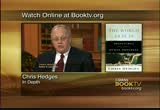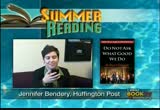tv Book TV CSPAN May 27, 2012 4:30pm-6:00pm EDT
4:30 pm
>> host: what do you teach your? >> guest: i teach a variety of forces, but primarily u.s. military and diplomatic history, which is primarily a two -week-old cold war force occasionally tonight on a a course on kennedy. modern u.s. principally is my area of expertise. i still also give you a survey where you get to introduce history to students who have varying backgrounds in history. >> host: how long have you been at liberty? >> guest: i'm finishing the eighth year here and before that i taught five years at texas tech university. i came here in part to help them start a graduate program and since then that is started and i chaired the department. >> guest: >> host: we've been talking with david snead, chair of the department.
4:31 pm
talking about this book, "john f. kennedy: the new frontier president" nova publishers.com is the website in case you're interested. >> up next, historian sub for profiles aaron burr, vice president of the united states. he told former secretary alexander hamilton in a duel. mr. brands represents a different standard than your politician to a collection of letters between aronberg and his daughter, theodosia. this is about an hour and 15 minutes. >> i am delighted to speak here. i was like to speak in washington with where the audiences are well informed and engaged. having just finished teaching a semester for the year at the university of texas, isolated to speech or not it's the people you don't have to be here. there will be no tests. i say this sincerely. i'm very flattered you took the time in your evening to come
4:32 pm
listen to me. i think that my students by and large are interested in the subject, but i know perfectly well that if they did not test, it did, academic papers or rather, bo, the sympathies to be empty. none of you have to be here, but she did, and i find that very flattering. i could i supposed to be a test at the end. the title of my talk on which i forgot until jamie just mentioned is the unknown aaron burr. i'm going to tell you what i read a book about aaron burr. the title of my book is called "the heartbreak of aaron burr." i can't tell you the whole story without giving away the ending. i don't want to give away the ending because it's not just that i want you to buy the book and read the book and enjoy it and hang around till the end, but it has to do with the reason i wrote the book in the first place. this goes back to my experience of writing, my experience of reading and in particular, my
4:33 pm
experience of listening to a question that my mother has been put into me for the last 23 or 24 years. and the question i would get to in a moment. but it goes to the heart of why people wait and why people read. i teach history at the university of texas. i also teach writing. i teach writing to graduate students bear the graduate students in my writing seminar also completed a couple days ago come from history. they come from communications, journalism. they come from the english department. they come from fine arts. they are students. they are apprentice writers. and they are working on developing their craft, their skill, their art in various
4:34 pm
genres. some of them, that historians are going to write nonfiction. journalists are going to write nonfiction of a somewhat different view. but i also had novelists. i have poets, playwrights and screenwriters. and they are sharing to accomplish something else. well, except the one of the things we talk about is what it is we are all trying to accomplish. can this get to the question of why people write and why people read. i can put the question to you. you're all readers i assume. i could ask you, why do you read? and may in fact take that question and hold onto it because there will be a question-and-answer time at the end. and typically the questions come from the audiences at answers come from the speaker, but we can turn it around. if you care to volunteer why you've read later, i'd be happy
4:35 pm
to hear what it is. but i will tell you what kind of reactions i've gotten over the years i pose this question to various audience is including my students. including my mother. i would just that i had some time waiting for the lectures was just talking to mom who lives in oregon and pleased to say she's doing well. she's 86 years old. anyway, thank you, yes. i will tell her you applauded. at least a couple of you. is that a applause that she received six, is still in good health, reads my writing? all of the above? about 15 years ago is teaching an undergraduate history mnr. it was for seniors, history majors. it turned out that the 15th students in the class were all history majors, but half of them are english majors as well. and it just so happened that
4:36 pm
would allow. the students were reading various sort of great of history, but the particular genre that i chose for that semester was great biographies including autobiographies. i'm so, they read selections from boswell's life of johnson and the autobiography of benjamin franklin and the confessions of saint augustine and julius caesar's commentaries on the war. one work that particularly caught their attention was the autobiography of benvenuto cellini. how many of you have read it? you should all read it. it's fantastic. the thing that makes this so interesting is that it is a work of supreme egotism. schilling is convinced that he
4:37 pm
was the greatest artists that god ever put on the earth and it comes through on every page. but he tells the story in a charming enough action untruth -- a mature and not put off by it. you're well enough to go along with it. so i have the students read a selection where cellini is providing a masterwork and becomes very frustrated with the type missions. he has cast the original mole and now just left the technicians to mount the bronze in poorer then. it's a very complicated mold with a statue of hercules with the head of medusa and acm. and it's real complicated because it has to go from the heel all the way to the tip of the army through the snakes coils and had them everything. he chose this wonderful story about how he is on his deathbed.
4:38 pm
but the technicians are getting a break from serious to come off his deathbed and they can't get the fire hot enough to melt the metal hot enough and so they throw it all the fire but they've got a miniature when the furniture and start tearing the paneling off the walls and throw that in. he is developing these the various preaching while the fires burning any poisoning to indicate the mold and then he collapses on the floor and he wakes up only four days later not knowing if he's dead or alive. and so he realizes he's alive than to curse them eventually and says how does it turned out? may knock the mold off and it turns out there's this brilliant masterpiece. the end of the story is no one could've done it to me. so the students come that they don't know quite what to make of this. so i asked the students, you know, any time there is a work presented to you as being true, you have to ask yourself whether
4:39 pm
it isn't something you read or send in your encounter in daily life for some political speech that a candidate is you believe them. you don't have to take things at face value. do you believe this story? i asked them, how would you collaborate a story like this or any story? i mentioned to the students that any time you encounter anything, you need to ask, is it true? this is especially true these days of my students get so much of their information off the internet. it has always been an issue when you pick up a book out of the library just because it's in the book. do you believe that? i will tell you that one of the lessons my students learn and this is a very good lesson for them. after well most of them, not class member of the teacher for the semester. eventually some of them catch on david and the indifferent
4:40 pm
entries and laughing for them to realize that the person who is standing in front of them because most of them haven't printed them out there before and that i faced a mnr and the guy who wrote this stuff in the book and they recognize when i'm talking -- i try to get it all as accurate as i can, but ordinary people, you try to get things right, but some of the stuff you get wrong. they realize it's an ordinary person who wrote this book. now i will tell you that some of them are mildly impressed when they discover i've written a book or one book or another. but really gets street credibility of my students is when they see me on tv because all of a sudden he's somebody. anyway, the students all agree that this is a fascinating story and the sacred story, great
4:41 pm
drama, great characterization on this. it occurred to me at that point to ask a question that had never occurred to me to ask before because i thought i knew the answer. i said, suppose you had read this story. suppose i'd erase the name name of the author. suppose i hadn't told to put it this a true story or a fictional account, whether this was something that actually have endorsed him pain that somebody just made it. you didn't know this. you just read the story and you all agreed great story, great story. now, suppose after having read the story i presented you with one additional piece of information. the additional piece of information was coming and i was in the great story you read actually happen. it's a true story. what would that do to your evaluation of the story? would it make it a better story or no different?
4:42 pm
well, i was flabbergasted by the response and i was flabbergasted by the response because i didn't get the third alternative, which hadn't even occurred. the third alternative is that makes it a worse story to know that it was true. now i guess i hadn't really confronted the degree to which inserted a nonfiction kind of%. but it simply seemed to me. if you go to a movie and it's a great story based on a true story, that seems to be a marketing pitch. the marketing department angst that makes it better because they certainly advertise it. well, of this group, when asked the question, how many of you think that it would make it a better story? about half of the students raised her hand. i was surprised it was only half. i was seven out of 15.
4:43 pm
and then it got there a, i think i have a friend said no different. a good story is a good story. but then three of them were the ones who really amazed me by saying, it made it worse. and i was trying to figure out why in the world -- how in the world it could be worse. and i thought about this for a long time. i will tell you the answer that i came up with because the answer that i came up with is related to the question that my mother has been posing to me how the series. i mentioned that i teach writing and one of the things that i convey to my students, my apprentice writers is that of all, writing has enacted communication. if you are going to communicate effectively with your readers, you have to have some idea who your readers are. what expectations they have, what knowledge they bring to the
4:44 pm
subject. unless you have a reader in mind, you cannot hope to convey whatever you're trying to convey affect the way. so every reader -- every writer has to have a model reader. you know, the reader in the back of your mind is this on your shoulder, the reader you are imagining is going to reach her stuff. so you'll know, is this too much information, too little information, diverting novel about right? is quite a difference if you are writing for an adult and if you're writing for a mature adult. anyway, so for years and years i had the very good fortune to have the best possible model reader, namely my father. and when i say the best possible model reader. the first couple books were written for the purposes of getting a job at the university and getting tenure.
4:45 pm
so the audience there was the academic community, the specialist who wanted to know that this is cutting-edge in a particular set discipline i riding in. but after i calmed her side that i decided i wanted to reach out to a larger audience. an audience very much a suppose like you, people who are not probably specialist in history, people who have a general interest in the world, who, some experience, who, some background in reading, but just want to know more about their world. my father fit this category very well. he was a self-employed businessman. yet when a business for his entire working life. but then he retired and in his retirement he started reading more than he had. while he was working he rarely read books. he read "the wall street journal." he read "fortune" magazine. he read business staff. he read iron age. i grew up reading iron age.
4:46 pm
an interesting magazine. i don't know if it still exists. but in his retirement he wanted to be -- he liked to read history. he liked to read a graffiti. he liked to read the kinds of books i was writing. he read every book that i wrote. i know this because he would offer his critique of my books. and he was pretty candid. but he likes something you say billy, you did a good job. when he did mike echo mead said billy, not your best. i learned my father's standards from watching him eat their meals by mother would cook for him, a traditional relationship. another coat -- my father died four years ago. for the entire six years of their marriage, my mother would cut records for my father and dinner for my father. she refused to cook lunch for my father. he was expected to be working inside is a lunch.
4:47 pm
i marriage or father for better, for worse, but not for lunch. upon my father's death, another announce she was retiring from cooking that she has not cut every sense. anyway, my father would read my books -- excuse me, and he showed me how to deal with their meals that he wasn't particularly fond of. he was very diplomatic about this. if my mother made something like he was a wonderful. she took some pain -- or try something new that didn't work out so well, he just didn't say anything and my mom understood from that but okay, no, it means to do it again and it worked out very well. anyway, my father was more forthcoming with me. he would summon the first two chapters were okay, but it all down after that. my father read every book i wrote. my mother tried to read each
4:48 pm
book that i wrote. she says that she finished to a non. mom and son benjamin and could hear the other she says she finished was on the california gold rush. now, i'm not really sure she finished those, but as a dutiful son, far be it for me to. she says she did, she did. but it was very clear that getting through work of nonfiction was a task for my mother. she read out of some sense of duty to me. and every time after i wrote it took and she either -- well, she is to say she had it by her bedside as she would pick it up and read a few pages in a putter right to sleep. well, anyway -- after each such experience and that she she gave up she would say though, when are you going to write a novel?
4:49 pm
and i try to explain, mom, i like good stories. i read history because they think history stories -- there's stuff that happens that you just couldn't make a. and man, her reaction to that meet you realize that was the point. the point of novels is quite different in one basic way. i am going to contend that in a more basic way is quite different from the writing of history and biscuits -- i would ask my mom, so what is it about novels that she lay, that makes them preferable to history? and she said, well, one of the things i like is that i get inside the head of the care varies in a way that i don't when i read works of history.
4:50 pm
and i had to grant that that is generally true because if you adhere to the typical standards of history, where we don't get to make stuff up, we cannot impute thoughts, noted some ideas to our care areas and must somehow we should get them to say it. unless they write it down. so we cannot just adjective blue sky on the morning of july 1, 1863 abraham lincoln woke up in a fine note unless he told somebody who wrote it down or wrote a letter. when you write novels, that's exactly what you do. but i said mom, i have been working my way around that problem by writing biographies. because with biographies, they are all about character.
4:51 pm
and i do get inside the heads of my subjects because they do tell me what they are thinking. they write letters. they write diaries. she says okay, yeah, but there's something else that i like about novels. and that is very romantic interest in novels. we can find out about the love lives of our care areas. and i said yeah, that is true, too. but with certain works of nonfiction, with certain biographies, you do get right to the heart of the matter. well, not entirely because once again we are constrained by what our characters say, what they write down. and here is where the paths start to part and i would ask you, do you rate down your deepest thoughts?
4:52 pm
do you write down your candid emotions? some of you do, but i would bet that most of you don't. and even those of you who do, probably don't do it in a form that's going to survive 100 years of his story is coming along in the next century can have access to it. so it is indeed true that it is hard to write about the love lives of our care bears in a nonfiction form without inject and into a way that history matters don't get to. and i will say that i try to do this in a -- the last biography ebro, which was about franklin and eleanor roosevelt. and in fact, a very large part of the stories about the relationship between the two. the complicated relationship. the relationship involved ulcers of things besides and in addition to the, one that was fascinating, but one again i
4:53 pm
don't think you could make this a. and biscuits to the heart of the difference between novels and nonfiction. and here i will throw in the category of movies. movies that are documentary. and that is precisely this, that the whole idea of of a novel is to pull the world together in a way that makes sense, in a way that has a particular story, that has a form. novels are just any old thing written down on the page. novels have carried varies. they typically have a protagonist. novels have conflict. there's usually an offending article conflict and the trauma and here's the critical thing. novels, like most movies, have a resolution of the con click. at the end of the book come at the end of the two-hour set the
4:54 pm
movie, you know how it turned out. now, nearly everybody who reads novels recognize says that that is not exactly the way the world is. the world isn't quite so tidy. the world is much messier than that. and i am going to throw out some ntu and you can agree with that or disagree with it. if you disagree vehemently, say so at the time of questions about talk some more. but i would suggest that people -- i'm going to get pretty inflammatory in the moment. the people who prefer novels to history by people who like their stories tidied up. fill it or stories to come to some kind of conclusion. it doesn't have to be a happy ending, but it has to be an ending, where he is most history doesn't have an end. her life does not conclusions. we strive for closure. but most of the time we don't
4:55 pm
get it. life just kind of goes on and you go to the next thing. well, that is part of what my mom and me too. what she really said. and i said mom, how about historical novels? how about the novels that are connected? she liked those okay. but she said the best novels i like are the ones that just don't have any connection to reality at all. i scratched my head over that until she said, i get enough reality in my daily life. the whole reason i read books and the whole reason i go to movies is to turn off the real world for a while and go someplace that is not at all connected to the real world. and it was this that finally made me realize what those students in my seminar were talking about when they said it made it worse to know that it is true because they really wanted a separation between their
4:56 pm
stories, their entertainment and the world. now, that's not really fair to the students to say their entertainment as though merely entertaining because of course people at that justify novels for years, for centuries although -- welcome undergraduate writing seminar comest you missed the great works of history from herodotus to the present. one of the things they discover some of you already know this, that novels were invented until 400 years ago. and before then, there was this distinction between what really happened and what was clearly made a. anyway, so i've been thinking about this distinction between novels in history. i've been listening to him that they're all the, same bill, when he going to write a novel? i wanted to please my mom. she's not going to live forever. i actually tried to write.
4:57 pm
i finished a couple of novels. they're sitting in a chore at home. i haven't done anything with them yet. but meanwhile, i thought, you know, there's got to be a way to borrow some of what makes novels attract these two readers and apply it to real historical tales. and so, the book that i'm supposed to be here promoting, "the heartbreak of aaron burr" is the second installment in what is projected to be a series that i am writing. this series was published by random house and it's called american portraits. the first book came out a little over a year ago and it is called the murder of jimmy disc, for the love of jc mansfield. it is a story that it gilded age love triangle gone badly wrong. so that was the first installment. the second is the heartbreak of air and earth.
4:58 pm
now, if you should choose to buy the book company you will see -- i will sign it for you by the way. you will see that it has the appearance of a novel, for example, there's no table table of contents. there's no author's preface, no and asked that the chapters don't have chapter names are just one comment, three, four and so on. you might think if you hadn't come tonight i would be delighted if you read i'd be delighted if he thought it was a novel because it are the case he would have been drawn into drawn into what he thought. but in fact, it's a world that exists i wanted to use the techniques of novel writing. every bit of dialogue in the air
4:59 pm
was spoken or written by the characters. now, you can't do this about every character. what you need to survive material material of history. i was fortunate by the existence of correspondent letters between steps two and his remarkable daughter, he does the crew he called see how and to weekend but theo is a young girl and a continued mtel -- this is why i don't know if i should tell you about the heartbreaking end. i will tell you exactly what happened, but eventually the correspondence is broken off by her dad. anyway, i had a chance to use this correspondence. it was some of the most candid correspondents have encountered in all the years i've been
5:00 pm
working on and read in history. so it does allow me to accomplish that one aspect of my mom was looking for in novels, namely kid inside the heads in the hearts the care areas. there is another reason i chose to write on this subject and the same reason i wrote to write on the murder of jim fisk for the right of jc mansfield. my writing is history and those who read american history face a daunting challenge in one regard particularly. and that is it's really hard to write about women in american history. ..
5:01 pm
>> and the reason for this is the books are conceived as a history of the united states sort of as told through biographies. and i was looking for a woman subject for one of these. and, in fact, i found one, but my publisher wouldn't let me do it. can you guess what woman i was looking for and found? eleanor roosevelt. i mean, just the fact that it's a very short list of women who played a large role in american public life on whom i can hang a tale of four or five decades of american history. women have had, of course, their roles in private life, but it's in the nature of private life that it usually doesn't survive in historical record. why did people start saving the letters of eleanor roosevelt?
5:02 pm
because she was important. do your correspondents save your letters that you write to them? and then do they deposit them in the local historical society? [laughter] well, maybe. and if they do, you will become -- i use my words advisedly here -- you will be become, literally, immortal. you'll become immortal in letters because future historians will find those letters and say, ah. so that's what life was like at the beginning of the 21st century. but anyway, so i wanted to write about women. after all, women have been half the population, and women have been a very large part of what happened even if it was hard to find them in the public record. so i decided that i could get at the story of women by not looking at the big issues of public life, but looking at some of the smaller issues. and so this is when i ran across the subject of my murder of jim
5:03 pm
fisk for the love of josie mansfield. josie mansfield was a woman who had no particular talents other than her, well, one could say her beauty, but i'm going to tell you the problem i had with this. josiemansfield clearly was very attractive to the men who knew her. and men lost their senses when they got around joseph my mansfield. and they did crazy things like one murdering another for the love of josie mansfield. and so i wrote this book, this earlier book about josie mansfield. and the book is really about josie. it's less about jim fisk. and, but because it's nominally a history book, my publisher wanted to include a photograph of josie mansfield. after all, it's a history book, and there's a photograph of this femme fatale, let's see it. but i didn't want to use the photograph. and i didn't want to use the
5:04 pm
photograph because two reasons. one is if you look at the photograph of josie, it's pretty -- the camera does not capture that essence that drove men crazy. you look at it and say, really? [laughter] the other thing is that novels don't have photographs. novels don't have illustrations of the main characters. the whole point of writing is to create a word picture. and so if i wrote a description of josie and then had a photograph of josie, either the writing would be -- it would either be wrong, or it would be redundant. and either way it would lose its force. but my editor insisted, and so there's a picture of josie. anyhow, josie was one story, theo -- burr -- was another. and i knew the end of the theo burr story.
5:05 pm
i guess i'll go ahead and tell you, many of you already know. theodocia burr disappeared at sea. she got on a coastal ship from south carolina heading for new york where her father was waiting for her. her father had not seen her in years. her father was living under an assumed name in new york, aaron burr. and theo was coming to see him. and the ship disappeared. nothing was ever heard of or found of the ship or of theo, and to this day no one knows what happened. it's assumed the ship went down in a storm, but nobody knows. in fact, fairly recently, within the last couple of years, somebody wrote a novel based on the idea that theo had survived and wound up on an island somewhere. anyhow, so this was my entry into writing about aaron burr. but the heart of the story, in fact, once again the title of the book was going to be, my
5:06 pm
proposed title in -- my thinking the whole time was "the disappearance of theodocia burr." and i thought, that's kind of intriguing. people don't just disappear. but my publisher thought aaron burr had more cache. it was a name that people knew. so it became "the heartbreak of aaron burr." and it's the story of aaron burr who is considered generally to be one of the great scoundrels, villains of american history. and i've always thought that the villains, the scoundrels are far more interesting than the heroes. and i also thought that anybody who was despised by alexander hamilton, john adams, thomas jefferson, james madison had to be somebody who had something going for him. [laughter] and so i thought i would try to tell the story. but i would tell the story
5:07 pm
through the relationship between aaron burr and his daughter. because the story of aaron burr is fairly well known, and i wasn't going to include any revelations on what exactly was burr up to when he traveled out to the west? was he engaged in what thomas jefferson announced to the world even before an indictment came down was treason? was he trying to destroy the united states? well, i'm going to tell you that you will not find a definitive answer to that question in my book because like so many important questions in history, it has no definitive answer. i'm pretty sure that aaron burr himself didn't know exactly what was intended. now, here i'm going to, i'm going to cite a distinction. you remember several years ago when donald rumsfeld was up
5:08 pm
lampooned, certainly criticized for drawing distinctions when he was talking about they're the known -- there are the known knowns and the unknown knowns and all of this. and jon stewart and the late night, jay leno, they got a lot of mileage. they thought this was great fun. well, in fact, i thought this was one of those instances where rumsfeld had it exactly right. because those people who are in the intelligence business, and i have this from some authorities in the intelligence business, william casey used to distinguish between secrets and mysteries. and in the intelligence business both of these are of interest if they involve something that your enemy or somebody else is going to do. but there's a fundamental difference between secrets and mysteries. secrets have a concrete existence. a secret is how many missile launchers did the soviet union
5:09 pm
have in 1985. and the cia spent a lot of time, effort and money trying to figure out what the answer to that question was. but it had an answer. but then a mystery is will israel bomb iran? next week? well, that doesn't have an answer, not at this point in time. because it hasn't happened. and likewise, what was aaron burr going to do in the west? that falls in the category of a mystery. i'm quite sure that he himself didn't know. but what took him out to the west? well, briefly i'll tell you his story of how he got there. aaron burr was a soldier, an officer in the continental army, he was a capable enough officer, he was also a lawyer, a very gifted lawyer. he was a man who, against the expectations of his friends, fell in love with a woman named
5:10 pm
thoedocia who was the widow of a british officer. now, the officer had died in the west indies years earlier, and he fell in love with theodocia and married her. now, there was an odd aspect to this. and the oddness lay in the fact that theo, theodocia, was ten years older than aaron burr. i should mention that aaron burr was quite a dashing and a relatively young man, handsome, charming. theodocia was ten years older than he was. she was neither beautiful, nor rich. but he fell in love with her. and they married. now, one asks across the centuries, what did he see in theodocia? because plenty of people married rich widows, and this is the way one's fortune was often made.
5:11 pm
he didn't. he married her quite clearly out of love. but love for what? well, love for her mind, love for her character. and they had a child, a daughter, whom they named -- he insisted that it be named after his wife, theodocia. aaron burr was decades, centuries ahead of his time in believing that women were fully the intellectual equal of men. and that it was only their lack of education that prevented them from attaining the intellectual accomplishments of men. so he decided that his daughter, theo, was going to have the best education that his money could buy. the education was conducted by tutors that were brought in, was conducted by him in letters, when he was home he would quiz theo. they would talk about summits of public affairs, history, of literature, of the classic, of
5:12 pm
the whole thing. and theo became his close friend, became something of his educational project, became his protege. and to read the letters is to see a father spending a great deal of time and effort on the education of his child. and watching her mature, watching her grow, watching her achieve the intellectual accomplishments that he was sure she could achieve. thoedocia, the mother, contracted cancer and died after a painful illness when young theo was 11 years old. and she became the first lady of the household. they had, burr had a mansion in manhattan, richmond hill was its name. and she, even when burr was not around, she would host elaborate dinner parties for diplomats,
5:13 pm
for the his community of new york, for distinguished visitor, for indian chiefs who happened to be in town, and everyone was quite amazed. and wonderfully impressed by the self-possession, by the maturity of this 14-year-old girl. anyway, burr meanwhile begins his career in politics, and he delivers new york state for the republican party. this is the jeffersonian republican party. in the election of 1800. and he's on the ticket, and jefferson's on the ticket. but you know the story of the, well, contested -- yes -- election. it was contested by accident because burr and jefferson tied. this was under the original constitution where each of the electorates got two votes. and it was at this point that some of the innuendos began to swirl around burr. and it was almost certainly due to the mischief of the federalists who realized they had lost the presidency, but
5:14 pm
they thought that maybe somehow they could weaken their political foes. and be i would remind you all that this was in an age when political parties per se were still considered illegitimate. the founders wanted to part of political parties. the founders thought that in a republic as opposed to a monarchy, in a republic loyal, patriotic citizens would always put the interests of the country ahead of the interests of party. and they thought that parties would be the downfall of the republic. but parties emerged despite the best efforts of the founders. maybe the -- no, despite the satisfaction of george washington who never admitted that he had any party affiliation, but alexander hamilton, thomas jefferson formed their own parties very quickly. and, well, anyway, jefferson did win the election of 1800 with burr as his vice president.
5:15 pm
but jefferson, jefferson, a wonderful individual who could say the most philosophically high-minded things and then do the most pragmatically low-minded things, jefferson was as dismissive of legitimacy of parties as anyone, and he was also the first and one of the most effective political bosses in american history. and he decided that burr had to be pushed aside, that the presidency the next time around after jefferson left office would go to another virginian, james madison. so burr got pushed to the side. meanwhile, alexander hamilton had been pushed to the side because he had fallen out with the mainstream and the federalists. so both of these men were in a position where their prospects were not quite living up to their ambitions. and so they got afoul of each other because hamilton had said some very nasty things about burr in one of the political campaigns, and burr asked him to
5:16 pm
retract, at least either to acknowledge and to corroborate or to retract. and hamilton got stiff-necked about this and said, no, no, you have no business asking me this sort of thing, and one thing led to another and then to that fatal duel in new jersey in 1804. now, hamilton was killed, burr was -- burr was not disgraced by the duel per se. it was really the machinations of thomas jefferson that made very clear that burr had no political future. so burr decided what's he going to do? he's an ambitious man, and he did what generations and generations of ambitious young men have been doing, and that was he went to the west. what was he going to do in the west? ah, this is the question. well, it almost certainly included either inciting or
5:17 pm
exploiting a war between the united states and spain. spain was then in control of florida and then in control of mexico. and spain was bottling up the united states from territorial expansion which burr, like most everybody else in the united states including thomas jefferson, believed was inevitable and a good thing. i live in texas. i wasn't born in texas, i grew up on the west coast, but i've been living in texas since the 1980s. and i can tell you that what burr was accused of doing was what one of the founding fathers of texas, sam houston, actually did 30 years later. namely, go off into mexican territory -- and by then it was mexican rather than spanish territory -- and foment a war and seize part of this foreign territory for the united states. this is what made andrew jackson famous in the wake of the war of
5:18 pm
1812. he, without authorization, rode into spanish florida and drove the spanish away. burr lived long enough to appreciate the irony of this. burr didn't get accolades for what jackson and houston did. burr instead got an indictment for treason. and the treason trial forms a large portion of my book. why do i spend time on the treason trial? in part because it allows me to bootleg some of the big stories of history into this little story. and also because in writing this book, after writing that book about the murder of jim fisk, the love of josie mansfield at the heart of which are three murder trials, i realized what dick wolf discovered years ago. [laughter] dick wolf is the inventer of the franchise of "law and order," or whoever created the original perry mason show. trials are naturals for telling
5:19 pm
stories. whether it's in novel form, ask john grisham, or in, you know, movie form or in nonfiction. why are novels, excuse me, why are trials such an attractive form for the reader? i don't know i'm not sure for the reader, i'll tell you why they're an attractive form for the author o. because, in the first place, trials have dialogue, and this is something that you don't find a lot of in nonfiction. and this is one of the appeals of novel bees. people talk to each other back and forth. it's rare that you find a work of nonfiction where you get much in the way of dialogue unless it's writing about a trial. because in a trial you get dying log and, furthermore, unlike the ordinary conversation of you and me where you wander around the topic and do this and that and start over and all this, in trials the conversation, the dialogue always has a point. and there's a built-in conflict, a protagonist and an antagonist,
5:20 pm
and there's a resolution. there's either a conviction or an acquittal. so a large part of my story is this treason trial. and i get to weave in not only aaron burr, but thomas jefferson who was, had taken up the role of prosecutor-in-chief, and he put the full weight of the federal government into the prosecution of aaron burr. but he was frustrated by burr who defended himself. he had very distinguished help. he was also assisted by the judge in the trial. and the judge happened to be that other bete noire of thomas jefferson, john marshall. sort of the last of the federalists. in the days when supreme court justices were also circuit cut judges -- court judges. and marshall sat for the circuit court in richmond. and the treason that burr was
5:21 pm
alleged to have committed aoccurred in kentucky which, excuse me, when kentucky was still -- no, i'm sorry, west virginia. when west virginia was still part of virginia. and so it was john marshall who presided over the trial. and who was not going to let thomas jefferson get away with any sloppy prosecution for treason. and, in fact, the burr trial became very important in american jurisprudence because under the constitution treason is very narrowly defined. it consists of waging war against the united states or abetting those countries at war with the united states, and it has to be witnessed by two eyewitnesses. well, the prosecution couldn't get the eyewitnesses because the stuff that burr was said to have done actually happened when burr was far away. and secondly, there was no war.
5:22 pm
and marshall ruled on this, and he instructed the jury you have to acquit. well, anyway, the rest of the story is -- i can't tell you the rest of the story, because i want you to read the book. [laughter] in fact, i'm going to stop there and ask if you have questions, and if, by the way, if you have any answers to the questions i've thrown out, i'll be happy to listen to those. so if you have any questions, raise your hand. and since we have a c-span group in the back, i will repeat the questions for the audience. yes, sir. >> [inaudible] >> okay. the question is, since i said i had a hard time coming up with women, how about the suffragists? here's a basic problem. i write books for the purposes of expanding knowledge of history, and i will say quite candidly, i write books that i hope people will buy. and you could name susan b.
5:23 pm
anthony, elizabeth katie stand -- stanton, and i have run names like that by my publisher, and i get a yawn. because compare that to, i don't know, let's say abraham lincoln. there's a huge market for all things lincoln. there's quite a small market for studies of the suffragists. i'm going to tell you a story about a historical colleague of mine who had written, he was trying to come up with a subject for his third book. he got tenure, he was faculty member at one of the colleges in the philadelphia area, and he wanted to write for a broader audience. his field is military history. so he was thinking, he was trying to come up with some general that he could write about. and his area was world war ii, so he presented, oh, joseph stillwell and the editors he's talking with, ah, not that many people know the name of stillwell, and i don't think there's much of a market. and he mentioned a couple of other sort of second-ranked generals. and then sort of at a loss --
5:24 pm
and his field was in particular the pacific theater of the war -- and so he couldn't think of anything else, he just kind of threw up his hands and said this a tone, a throwaway line, he said, well, i mean, i guess i could write, you know, another biography of douglas mac arthur. but there'd been a dozen biographies of douglas mcarthur, and the editor said, yeah, that's because people are interested in douglas mcarthur. [laughter] so i suppose if i were sufficiently imaginative and i had the sufficient sources, maybe i could elevate a relatively obscure woman, for that matter a man too, to a level that would grab people's attention and make that person famous. maybe. but it's a, i will say, a tough sell especially in this market. other questions? yes, ma'am, in the middle. >> [inaudible]
5:25 pm
how did the letters come out? >> a very good question. how is it the letters were saved? before i answer that question, i'm going to give you sort of a broader reflection. and this, actually, gets to the question that was asked here, how about the suffragists or how about people who aren't so famous? it is almost a truism of history that it is possible to write about extraordinary people or extraordinary times. or you can write about extraordinary people in ordinary times. so we can write a biography of george washington because george washington was one of the extraordinary individuals, and by extraordinary here i mean famous to the extent that people saved his letters. and people remember what they felt, what they heard when they encountered washington. if somebody's famous, the finding the record of famous people is not a problem. i wrote about benjamin franklin,
5:26 pm
and i have to say that the first 30 years of benjamin franklin's life go by like this in my book. why? because there are no sources on it. the one source is franklin's own autobiography. in fact, you can measure this in a wonderful published collection of the franklin letters that is about 37 or 8 volumes, published by yale university press and the american philosophical society. took them 50 years to publish it. now, volume one, volume one goes from franklin's birth til the age of 30. and it's about that thick. volume 38 -- if that's the last one -- is equally thick, and it covers three months. not three decades, but three months of franklin's life. why? because then he was world famous, people saved everything. so you can write about extraordinary people in ordinary times, you can write about ordinary people in extraordinary times. for example, you can write the ordinary person's history of the
5:27 pm
civil war. why? because it was sufficiently extraordinary that people wrote down what they were thinking and feeling. soldiers went off to war for have many of them, they'd never been away from home before, and they wanted to share that experience with the folks at home. or else they kept a diary, a journal. i wrote a book about the california gold rush. there is no lack of information about ordinary people who went off to california. why? because they knew this was a once in a lifetime thing. in those days before cameras, before cell phones with cameras, how did people record the adventures that they encountered, the things that they saw in a new place? they wrote 'em down. nowadays i don't know what's going to happen, you know, because people aren't saving their photos, i guess, from their cell phones and everything else. that's a different matter, and we could talk about e-mails and what that means for future historians. but anyway, so, but for some reason a great many of the letters between aaron burr and
5:28 pm
his daughter theo were saved. i don't -- clearly not all of them, because there are gaps in the correspondence. and it's really hard to reconstruct why some of the letters were saved and some were not. there was a moment when, in fact, i cite a letter that aaron burr thought might be his last letter to theo. it was written on the night before his duel with alexander hamilton. and he knew perfectly well he might not survive the next day. so he wrote a letter to theo explaining what she should do with his letters and papers, and this is one of the reasons for the negative opinions that had developed over time regarding aaron burr because he said burn all these letters, especially the ones that are bound up in this red ribbon. and, well, he survived. but the letters didn't. and whether theo did away with them, whether they were lost at sea with theo, i don't know.
5:29 pm
but there is one interesting aspect about all this, and that is that relationships like burr's with theo are a rich source for historians, but only when the individuals in the relationship are far apart. i'll bet that many of you in this room read david mccullough's biography of john adams. and you'll know that mccullough's secret weapon in that book was abigail adams. in fact, i was at a conference or a meeting where somebody asked dade mccullough, well, now you've written about john adams, are you going to write about abigail adams? and he said, i already did. in fact, that's sort of what i did with eleanor roosevelt and franklin roosevelt. the book is called -- it's only franklin roosevelt in the title, but it's real a dual -- really a dual biography. the best parts of the book, the
5:30 pm
parts in particular that reveal a relationship -- wonderful relationship, provocative relationship between john and abigail adams -- they occur when they are far apart. itit's a wonderful love story, it's a wonderful story of a marriage, but it only works because they were apart for a very large part of the marriage. when they were together, they simply spoke. and what they said to each other over the dinner table at night no one knows. so that's a case where, and it's true with my book. i mean, i don't make a big deal of it in the book, i just have to pass over those sections where they're not writing to each other. but i can't offer a good explanation as to why some letters survived and others didn't. yes. >> um, thank you. your description of the story as a part of a way to present the facts in a trial is a theme of the american presidency.
5:31 pm
franklin roosevelt, for example, used the fireside chat as a very effective tool to tell the story of what was happening in the united states. and the current president, obama, has been accused of being too legalistic or not telling a story. so where does this fit into your -- [inaudible] >> the question is, how does the nature of story and how stories are told and how it has related at times to american politics, in particular how american presidents have cast their times as part of the ongoing american story, how does that fit in with my story? it's a wonderful question, and you gave me an opportunity to tip my hand about a project that i've been working on for years, and it's based on the title of this book, it's going to be a book one day -- i can't tell you which day, but it's going to be,
5:32 pm
because i don't know. the title of the book is going to be "the best story wins." and the whole point of the book is that the we as humans are, well, i guess i will say we're suckers for stories. or at least there's something in the wiring of our brain, maybe it's hard-wired, maybe it's soft-wired in, but we respond to stories. what are stories? i will put it this way, stories are simplifications of some my candidated reality that give us some kind of purchase, some kind of grip on the world. and these stories can be creation myths, for example, that say how the world came into being, that also maybe explain. at the heart of every religion is a story, a very powerful story that tells us why we are here and, perhaps, where we are going. politics is all ant stories.
5:33 pm
franklin roosevelt, you mentioned his fireside chats. roosevelt could tell a story that would grip the american people and make them believe that their government was taking action, was taking their side in the midst of this great crisis of american history. and although roosevelt hardly ended the great depression, he lifted a great deal of the despair that had settled this on the country -- in on the country, and it seemed to be undispelable as long as herbert hoover was in the white house. every president, every successful candidate tells a story. and barack obama was one of the greatest story -- and, by the way, when i say stories, i'm not weighing in at all on whether the stories are true or not. because there are certainly true stories, so if, when i say that barack obama spun a great story in the campaign of 2008, i don't mean to say that he was making this stuff up. but what he did was to convince
5:34 pm
voters, at least 53% of them, that a vote for barack obama was a vote for a better vision of america. and it was -- i've never seen, in my observation of political candidates that goes back to john kennedy and my study of candidates goes back to george washington -- i've never seen a better political candidate than barack obama. in all right package because he was -- in large part because he was a little like aaron burr in this respect. he was able to allow voters, ordinary americans, to project on him their hopes for what the country could become. and so, you know, if the message is hope, if slogan is "yes, we can," that's very attractive, especially given the context of 2008. and it's also, well, it's a reminder that being a candidate is different from being president.
5:35 pm
and it's one of the reasons that many of obama's liberal supporters have been quite disappointed, because he didn't live up to, well, the projections that they put on him. and a lot of it has to do with the fundamental distinction between being a candidate and being an office holder. when you're a candidate, yes, we can, boy, that's a powerful and appropriate phrase. but when you're president, the operative phrase is much more often, no, you can't. [laughter] because presidents have to decide. candidates don't have to decide. they can promise the world. but once you get into office, you have to say one thing or another. anyway, yes, ma'am. >> i want to answer your question -- >> please, do. >> -- about why i read history. >> okay. >> i get into the stories like it's a novel, and i'm in there hollering at, like, that cavalry
5:36 pm
guy that sent the vermont person during the third day of gettysburg. >> yes. picket's charge? >> yeah. but the horse thing after picket's charge -- >> okay. >> you need a sister! i'll be your sister, i'm just jump into this book and punch that guy in the nose. [laughter] >> interesting. i'm not sure that i can do justice to that by repeating the question, but the essence of the statement was that she reads history because she likes to get involved. she likes to get in the middle of the story. now, i will tell you as a professional historian i try to avoid that, but i don't always succeed. when i was writing about benjamin franklin, i tried to keep my distance. i make a real point, and i do succeed in this, in not passing judgment on my characters. so i will tell you i tell readers in my week on franklin
5:37 pm
roosevelt, i will tell you he was a great president, but great in the specific sense of having a great effect on the world around him. but i won't tell you whether i think he was a good president or a bad president. i won't tell you whether i think the new deal was a good deal or bad deal. i leave that to readers to decide. i lay out what it was, i lay out the reactions and the justification for it, but i leave it to the readers to draw their own conclusions. and i think not all historians do it this way. in fact be, i would say the most successful commercially don't do it this way. i once asked david mccullough if he would write about somebody he didn't like, and he looked at me, why would i do that? a lot of people go to biographies to be able to cheer for somebody. and so it's a lot easier, it's sort of like the rule of thumb, did that broadway musical work? well finishing people come out of the theater -- well, if people come out of the theater whistling, then it worked. i want readers to form their own
5:38 pm
opinions. i wrote this book on franklin roosevelt called "traitor to his class." i polled various audiences, do you think a thumbs up on roosevelt or thumbs down? because traitor, that's a bad word. but it's not traitor to his country, it's traitor to his class. anyway, i try the keep my distance. every so up i can't. in the last years of benjamin franklin's life, he was coming back from paris. he'd been in paris for nine years. he was coming home because he was sick, and he wanted to die back in america. and he'd been estranged from his son william by the revolutionary war. and his grandson, will yam's son, wanted to get the two men -- temple was the grand son's name, wanted to get the father and the grandfather back together. so surreptitiously william -- excuse me, temping arranged a -- temping arranged a meeting. it was going to be the last chance for benjamin franklin to see william franklin who was
5:39 pm
living in exile during the revolutionary war. and so temple brought the two of them together, and at the critical moment william, the son, by this time he's 57 years old or something like, full-grown man, he has decided that his father will not live forever, not much longer, and so william holds out his hand to make amends with his father, benjamin. and i'm sitting there writing this part of the story and trying to keep my distance, but trying to imagine what's going through benjamin franklin's head. i have three children. and i cannot imagine anything that any of those children would do that would cause me to permanently write them out of my life, especially even if they had done something and then afterwards said, oh, let's let
5:40 pm
bygones be bygones. and so i wanted, i had found myself without wanting to sort of rooting for ben franklin, get him to do the right thing. and most of the time he did the right thing. but when william was holding out his hand, i wanted to reach across the centuries and just take benjamin franklin -- take his hand, dammit, take it! but he didn't, but he didn't. and he went back to america, and he never forgave his son. for, well, doing what his conscience told him to do, to side with his king. and there, i had a particular reason, part of it was the father in me saying, come on, your son is holding out his hand to you. but i will confess that there was another part of it, and that is that the one of the very few acts of franklin's life that i
5:41 pm
couldn't explain. because he was on the whole a very reasonable person. and he had fallen out with many in england during the revolutionary war, but one by one he had made up with them. and i could not figure out what was going through franklin's head and through his heart at the time. and, now, we historians, at least the more modest of us, we don't claim to have all the answers. but this was a big part of franklin's emotional life. and i realized that i don't know why he did this very important thing. and it's toward the end of the book. and i thought, i don't know, maybe he snowed me all along. you know, maybe there is this dark franklin character that i'm just not getting. so i had to quickly write the end of that scene and get to the end of the book.
5:42 pm
i still don't know the answer to it, but, yeah. other questions? [laughter] yes, sir. yes. >> a former student of history, i think -- >> be former student? are there such things? >> well -- [inaudible] [laughter] your students, i think, must be very lucky. you've told us a lot about what burr did, and most of us are used to thinking of him as a villain. without giving away all of your book, what was -- do you think, was in his heart? >> i think that burr was ambitious. i know that burr was ambitious. i think that he saw that the path to political achievement was closed in the east because both of the major parties were dead set against him. and so he wanted to go west. he recognized something that we have forgotten, and that that is before the age of steam boats and the age of railroads once
5:43 pm
you got west of the appalachian mountains, gravity pulls you to the west. there was very little that said a continental republic could survive. and it's worth knowing that -- or remembering that there was no particular reason to think that the continental republic should survive. just a few years before, five years before thomas jefferson himself had been an author of the kentucky resolutions that, in essence, laid the groundwork for nullification and secession. so if you believe in self-government, especially when the american republic was no more than a generation old, it was entirely consistent with that view that if the people of kentucky and louisiana and tennessee decided that their political interests, their self-interests were better served by independence from
5:44 pm
america, from the united states than by sticking with the united states, that that was exactly the logic of, well, the declaration of independence. and so to think in terms of end rating the west, it would be a -- of separating the west, it would be a voluntary separation. one of the reasons burr went to the west was to sound people out. andrew jackson, first of all, celebrated the fact he had killed alexander hamilton. everybody in the west thought burr was a great man. and when burr talked about -- it's hard to know exactly what he said, but when he talked about a possible independent future for the west, it was entirely consistent with american philosophy of politics including that of thomas jefferson, but even more importantly it was the almost inevitable outcome of geography. because once you've crossed the mountains, the rivers all ran downstream, and the rivers were the essence of commerce. they were the avenues of
5:45 pm
transport. and jefferson himself sometimes wondered whether louisiana's fate was with the united states. and so burr was simply, i don't know if he was articulating or was simply letting people articulate what they thought their future might be. because if you lived in new orleans in 1805, it took forever to get to washington or new york. and you could well ask yourself how can those people in the east govern us? that was part of what he was up to. would he have waged war against the united states? i doubt it. certainly. i mean, he only had 50 guys. so he didn't have an army he could wage a war with. he did hope that a war would break out between spain and the united states. so did andrew jackson, so did james wilkinson, by the way, who really was the traitor in this story. wilkinson for decades was on the payroll of the spanish
5:46 pm
government, inbeknownst -- unbeknownst to his superiors in the u.s. army and in the u.s. government. anyway, so burr's logic strikes us, perhaps, assuming that he did what he was alleged to have done, to have plotted this scheme to separate what is, well, the mississippi valley or texas and beyond from the rest of the united states. but it hardly seemed, it hardly seemed a heinous crime to most of those people living in the west at the time. and i will simply add that there are plenty of people living in the states of the former confederacy today who think, you know, the confederacy lost the argument on the battlefield, the argument that states have a right to chart their own futures. anyway, so that's what i can make of it. how are we doing? >> i think we're times up. >> all right. yes, yes, i can't let you get out of here without at least the possibility of buying a book. thank you very much, you've been
5:47 pm
a wonderful audience. [applause] >> is there a nonfiction author or book you'd like to see featured on booktv? send us an e-mail at booktv@cspan.org. or tweet us at twitter.com/booktv. >> here's a look at some books that are being released this coming week. in "tubes: a journey to the center of the internet," andrew blum provides an in-depth look at how the internet functions. mikal casey, a managing editor at dow jones argues that international governments these to work together to create an efficient and fair global market in "the unfair trade: how your broken global financial system destroys the middle class." douglas brinkley recounts the life and career of journalist and anchor of the cbs evening news walter cronkite. peter edelman, professor at
5:48 pm
georgetown university law center and adviser to senator robert f. kennedy from 1964 to 1968, derives an analysis of income inequality in the u.s. in "so rich, so poor: why it's so hard to end poverty in america." in "born to battle," grant and forest, shiloh, vicksburg and chattanooga, the campaign that doomed the confederacy, jack hurst documents battles during the civil war. supreme court justice antonin scalia and brian garner, editor-in-chief of black's law dictionary, explain the process of judicial decision making in "reading law: the interpretation of legal texts." look for these titles in bookstores this coming week and watch for the authors in the near future on booktv and on booktv.org. >> the world's a big place, but certainly the most powerful additives are these huge
5:49 pm
corporations, corporations like goldman sachs, for instance. because i spent so much of my life in the developing world, places like africa, latin america and the middle east just to give you a small example, i saw what happened when commodity futures were bought up by corporations like goldman sachs and wheat, for instance, which it has in the last year increased by, its price increased by 100%. i saw the human consequences of that. the children who were malnourished and even in some cases died of starvation because they couldn't afford to eat. um, you know, we -- the wars in both iraq and afghanistan have very little populist support, and yet for a handful of of corporations -- lock he'd martin -- lockheed martin, halliburton -- they're immensely profitable as war is for a certain tiny segment of the power elite and always has been as medley butler, you know, war's a racquet.
5:50 pm
so i think that we, unfortunately, have created a world where power has become centralized in the hands of a select group of corporations that are more powerful than the state itself. that it is within the american political system impossible to vote against the interests of goldman sachs. and unless we thwart that power, we are doomed, because corporations, unfettered capitalism and there was a great book about this in 1944 called "the great transformation," turn everything into a commodity. in that sense karl marx was right. unfettered capitalism is a revolutionary force. and human beings become commodities, the natural world becomes a commodity that you exploit until exhaustion or collapse. and that's why the environmental crisis is intimately twinned with the economic crisis. and if we don't somehow find a mechanism or a way to break the power of those corporations, um,
5:51 pm
they will trash, continue to trash the ecosystem to the point at which life for huge segments of the human species will be unsustainable. >> host: chris hedges, david chao e-mails you: do you see today's economic and political climate as somewhat resembling that which existed in germany in the 1930s? >> guest: well, noam chomsky, and i'm a great admirer, has made that comparison. i think in some ways, yes. it's always difficult to make those historical analogies because one has to be very cognizant of the major differences including the mass bive war reparations, the defeat of world war i, the fact that germany had no real tradition of a liberal democracy under its monarchy. but i think that there are some frightening similarities. the most important being a kind of vie marrization of the
5:52 pm
american working class, the disenfranchisement of working men and women, of the, you know, used to be in this country going back to the '50s into the '60s that you could work in an auto plant or a steel mill and make a salary that would actually support a family and allow you to buy a small house and send your kids to college, and you had medical benefits and a pension plan, and all of that's vanished. we have thrust our working class into the service sector economy, low-wage economy, households not only do people tend to work within the working class more than one job, but almost everybody in the house is working in order to keep afloat. and that has been a devastating change. and i think one of the, or the rise of the christian right as i argue in "american fascist" is directly linked to this despair.
5:53 pm
because these economic dislocations bring with it destructions of communities, destruction of families, substance abuse, domestic abuse, all the attendant problems that come when communities break down, and people retreat from this reality-based world which, frankly, almost destroys them, almost has destroyed them into a nonreality-based belief system, and all totalitarian systems are nonreality-based belief systems. a world of magic, a world where god intervenes on your behalf. and i i think the only way to bring these people back into a reality-based world is to reenfranchise them within the economy. and i think this is something that we saw in vimar, that it was despair and all the great writers on totalitarianism, karl popper, fred stern, have used despair as that starting point that drives people into these very frightening movements. and i think that despair is very prevalent within american
5:54 pm
society and very dangerous. >> host: in his 2005 book "losing moses on the freeway: the ten commandments in america," mr. hedges writes: >> host: susie in l.a., good afternoon. >> caller: chris, i want to thank you for your thoughts and your books. they're very deep, and they really open many of our minds to very important concepts. and you really try, at least from my observation, you present a lot of deep thought and objective reality. i was troubled, however, in the area when you talk about the middle east because you talk about your history in terms of
5:55 pm
knowing arabic and the people there. but i was wondering, also, if you had an equal knowledge of hebrew and the people on that side? >> guest: well, i lived in jerusalem for two years. i don't speak hebrew. that was a conscious decision because when i worked in the middle east, to be working in syria or baghdad and to speak arabic and have any hebrew words creep into your arabic could immediately land you in prison, although i have to say that eventually in both iraq and iran i was thrown in prison anyway, or jailed for brief periods of time. i have a great admiration and affection for israel, and i think that the, um, parameters of the debate about the middle east and about the israeli/palestinian conflict in israel are far broader than they
5:56 pm
are in the united states. my opinions are not particularly controversial in jerusalem among most of my friends who sort of yawn and pour themselves another beer. but they are in the united states. the newspaper, for instance, the israeli newspaper, i think, has probably the best coverage of the palestinians of any paper in the country. and all of these articles are written by israeli jews. danny rubenstein, emil haas, gideon levy, these are great, great journalists and do israel credit. so i think that the frustration for many of us old middle east hands is that we saw possibilities in os o low -- in oslo and in the relationship between rabin and be king hussein, and i knew king hussein and covered rabin. and with the assassination of
5:57 pm
rabin, we watched that hope essentially vanish, and israel as the united states has essentially become captive to a really rapacious right wing. i mean, for instance, the israeli foreign minister who has openly called for the ethnic cleansing of israeli, arabs and palestinians, i mean, this was unthinkable when i first got to jerusalem in 1988. and for me it's really a debate ant the health of the middle east and the health of the israeli state itself. i don't think that responding to historical injustice through the use of force and occupation is in the long term productive for the state of israel itself. yet at the same time, of course, i adamantly oppose -- and there are those within the arab world who call for the destruction of the state of israel. most states, including our
5:58 pm
own -- i've spent a lot of time in this pine ridge for a new book -- were founded on historical injustices, but i think we have to work out, as rabin wanted to, an accommodation whereby both peoples can live in dignity. >> you can watch this and other programs online at booktv.org. >> what are you reading this summer? booktv wants to know. >> this summer i want to read the book "do not ask what good we do" which is about, it's sort of an inside look at how speaker john boehner manages tea party freshmen in his conference. there's some great lines that i've heard, i've read in articles about the book that show just how crazy it can get in there with a lot of these freshmen who are put in by the tea party, who arguably are controlling the way that the house is running even though they're freshmen and john boehner's in charge. there's one line i have right here, um, apparently in a
5:59 pm
meeting with his conference boehner told people, get your ass in line, and i think this past congress has been so polarizing and so uneffective that a book like this would be great for some summer reading, to just kick back and figure out some of the dramas that were actually going on behind the scenes as we watched nothing happen. um, another book i'd like to read on a totally different note is called "love is a mix tape." it's a story about -- it's written by someone who works for "rolling stone," but it's a personal story about how he fell in love with someone who also fell in love with him, they were a very unlikely pair, and from what i understand she dies, and he's devastated. but then he, they used to make each other mix taped which is something i did for years and years and year t
213 Views
IN COLLECTIONS
CSPAN2 Television Archive
Television Archive  Television Archive News Search Service
Television Archive News Search Service 
Uploaded by TV Archive on

 Live Music Archive
Live Music Archive Librivox Free Audio
Librivox Free Audio Metropolitan Museum
Metropolitan Museum Cleveland Museum of Art
Cleveland Museum of Art Internet Arcade
Internet Arcade Console Living Room
Console Living Room Books to Borrow
Books to Borrow Open Library
Open Library TV News
TV News Understanding 9/11
Understanding 9/11